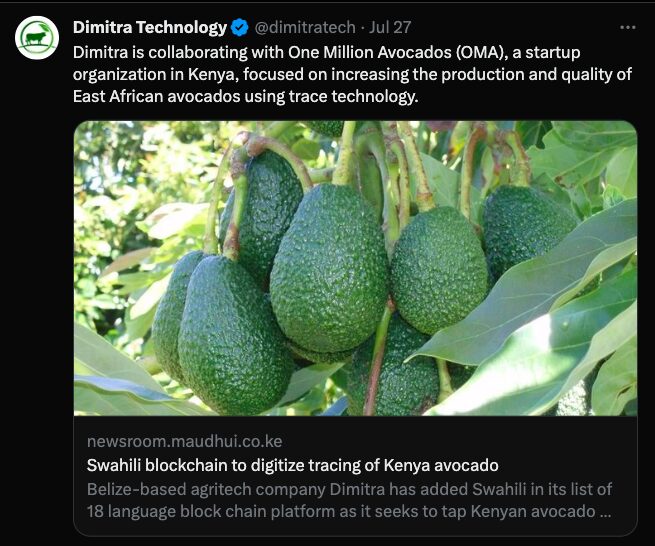Small farmers in the developing world may be on the cusp of an agricultural breakthrough. With emerging technologies like satellite imagery, drones and machine learning boosting productivity, it’s becoming more viable than ever to sell their produce in places like Western Europe.
There’s just one catch: avocado farmers in East Africa or coffee growers in Latin America have to be able to document that their crops have been grown in accordance with sustainable agricultural practices.
Their harvest bounty can’t come at the expense of denuded forests or through the assistance of child labor. And if their products are labeled “organic,” they will have to provide certification that no synthetic fertilizers and pesticides were used.
This is where blockchain technology could play a significant role.
Generating an immutable record
“Blockchain creates a great solution with an immutable record, particularly [when] combined with mobile” and other emerging technologies, Jon Trask, CEO of Dimitra — an AgTech firm active in 18 countries, which has worked with government agencies in Brazil, India, Uganda and Nepal — told Cointelegraph.
On July 20, Dimitra and One Million Avocados (OMA) — a sustainability-focused tech group — announced a partnership to help Kenyan avocado farmers boost production and quality through cutting-edge emerging technologies, including blockchain.

Dimitra’s multitech platform, which also includes mobile technology, artificial intelligence (AI), Internet of Things devices, satellite imaging and genomics, will give small farmers “greater access to solutions to further promote sustainable farming practices, primarily in pest and disease prevention and data reporting,” according to the press release.
Another key goal of the partnership is to help farmers in East Africa “overcome traceability issues to ensure maximum value of produce and to align with international regulatory frameworks.”
It’s not just in Kenya or the African continent where this movement of agricultural goods from the Global South to the Global North is picking up, either. “We have the same situation in Indonesia, Brazil and a few other Latin American countries,” Trask told Cointelegraph. “When they [farmers] are exporting their produce, they can get more dollars per kilo.”
Documentation will be critical for would-be exporters, especially with Europe’s new…
Click Here to Read the Full Original Article at Cointelegraph.com News…























